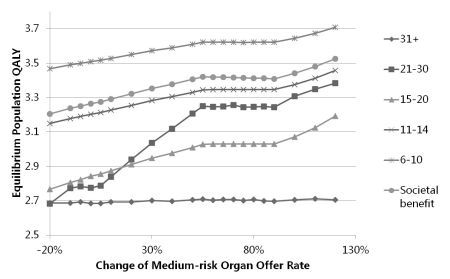Should National Policymakers Augment Marginal Liver Transplants: A Population Game Approach
Nephrology, LUMC, Leiden, Netherlands
Clinical Epidemiology, LUMC, Leiden, Netherlands
Einthoven Laboratory for Experimental Vascular Research, LUMC, Leiden, Netherlands
Surgery, LUMC, Leiden, Netherlands
Meeting: 2013 American Transplant Congress
Abstract number: D1597
Purpose: Federal mandates have increased the availability of marginal livers for transplant despite worse outcomes. Yet the impact of augmenting marginal liver transplantation from the societal perspective is still unclear. We examined the waitlist dynamics and changes in patients' decisions using a population game approach. Method: We constructed a Stochastic Population Game model in which waitlist candidates respond to liver offers in various qualities to maximize their expected Quality Adjusted Life Year (QALY). We classified candidates into model for end-stage liver disease (MELD) quintiles (<11, 11-14, 15-20, 21-30, and >30). Also we put liver offers into 3 categories according to the Donor Risk Index (DRI), namely, low-risk (<1.2), medium-risk (between 1.2 and 1.8) and high-risk (>1.8). We demonstrated a system equilibrium in the model and examined the behavior of the equilibrium as organ offer rate changes in a wide range. Results: If high-risk organ offer rate is increased to above 160%, newly added organs would be totally discarded. If medium-risk organ offer rate is changed to between 60% and 100%, newly added organs would tempt some MELD 15-20 patients to step away from accepting high-risk organs. Conclusions: (1) MELD groups <11, 11-14 and >30 would not change their acceptance strategies, while MELD groups 21-30 and 15-20 would become more picky when more marginal organs are offered. (2) In general, the societal benefit increases with more marginal organs. However, it reaches a plateau in certain ranges, both for changes in high-risk and medium-risk organs. Attentions should be paid to these ranges when new allocation policy is made.


To cite this abstract in AMA style:
Should National Policymakers Augment Marginal Liver Transplants: A Population Game Approach [abstract]. Am J Transplant. 2013; 13 (suppl 5). https://atcmeetingabstracts.com/abstract/should-national-policymakers-augment-marginal-liver-transplants-a-population-game-approach/. Accessed February 9, 2026.« Back to 2013 American Transplant Congress
